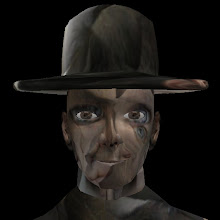I've just come out of a very positive and productive Elluminate meeting with fellow Open Habitat project members, and I just want to capture a few thoughts that are in my head in relation to my proposed phase 2 pilot plan.
The main issues that need addressing at the moment are around socialisation and collaboration, and the purpose and opportunities of 'The Book'.
Socialisation is a complex and subtle problem to address. The fact that I am working with brand new first year students pretty much as soon as they walk through the door is significant. As well as the idea of using Second Life as a tool to help these students make sense of everything, with the ultimate aim of increasing the long term effectiveness of their engagement with the real life course, the focus on in-world socialisation in the early stages of the pilot will help the process of collaboration later on. However, more detail need to be worked into this process of socialisation. In particular, the 9 day gap between the hand-holding in OpenSim, and the first formal in-world event needs addressing. This is an interesting problem, as the deliberate separation of the real students from their avatars to maintain their anonymity makes support difficult in this transition stage. Part of me wants to see if an OpenSim pre-induction is enough to give them them enough to survive when dumped into Second Life, but I also acknowledge that a little extra help might vastly improve their sense of purpose and direction. One way I've thought of addressing this is to produce a printed mini-guide, possibly containing a series of 'quests' for students to complete in over the 9 days in the wilderness. Kisa is an experienced official Second Life mentor, and I'm sure she would know what to put into this rough guide. It would also provide a nice output for others to use in conjunction with the OpenSim pre-induction approach.
The book of ideas, quotes and micro-projects that our students make use of in their first year might also provide the template for guiding students in both their acclimatisation, and their subsequent engagement. If we could hand each student a printed book of many Second Life relevant tips, quotes, micro-quests, places to go and things to do, then they can pick the ones that feel most relevant and do them during the first few days in world. I see them primarily working on these alone initially, so that when they appear nine days later in LeedsMet island, we have a diverse range of things to discuss.
This leads onto the whole issue of collaboration. I know from my often bitter experiences of group-working that collaboration can be a very difficult process to manage. I am convinced that the collaboration works best when an experienced manager works to identify the strengths and weaknesses of individuals, and constructs project work that engineers the complimentary qualities of individuals into a team. This makes the pre-construction of specific projects and activities difficult, as the manager of the team must construct a project which is best suited to the abilities and needs of the team. This links in with both the directive mentoring approach identified in the first pilot evaluation, and the non-directive coaching approach that I am keen to explore. The pedagogical design of this pilot is primarily a reflexive approach. The collaboration will be managed through a non-directive process of identifying abilities and needs through the formative assessment of the initial activities, and a directive process of specific project creation and management by a mentor. The precise nature of collaboration is impossible to predict at this stage, as it will depend on the students, what they have done, and what they need.
So, this is what I think I'm proposing:
A guide book needs to be produced, with a series of tips and mini-quests.
This book will be given to students at the end of the OpenSim pre-induction,and will provide individualised focus for independent learning and discovery for their nine days in the wilderness.
The first formal meeting on Leeds Met will connect together the avatars through dialogue and the e-portfolio tool.
This meeting will kick start the process of identifying the needs of the avatars through structured discussions, the publishing of images on the e-portfolio tool, the reflections of the avatars on their experiences so far, and the use of forums to manage asynchronous discussions.
Subsequent sessions in-world will focus on the construction of teams and collaborative projects that respond to the identified needs of each individual team member. For example, a student with who has recognised the importance of their avatar's appearance when in social situations would be put together with a student who wants to explore fashion design. A student with an interest in photography would work with a set designer to create a fashion photo shoot. Another student may put together an in-world exhibition of the photos and another may organise the opening of this event.
Subscribe to:
Post Comments (Atom)
Idea Stains
-
▼
2008
(94)
-
▼
September
(8)
- Oil spill
- From Habitat to G-Plan
- Back to plan, er, E, F?
- Pruning my previous ideas, and planting a big new ...
- Working the detail into the phase 2 pilot plan.
- The parallel BA(Hons) Graphic Arts & Design course.
- Enabling lucidity in a complex, fragmented world o...
- Developing Assessment to support Student Learning
-
▼
September
(8)

No comments:
Post a Comment